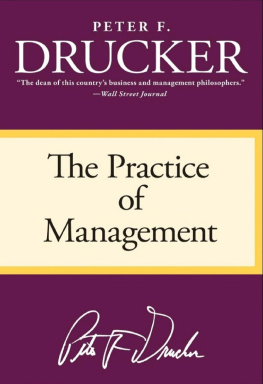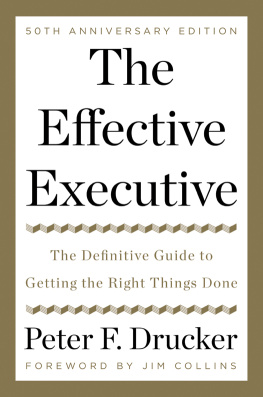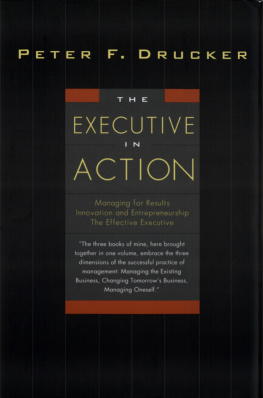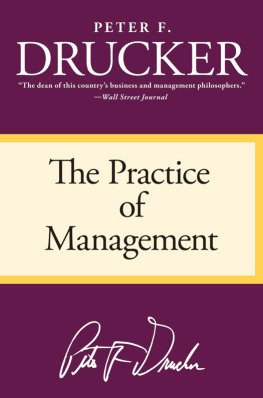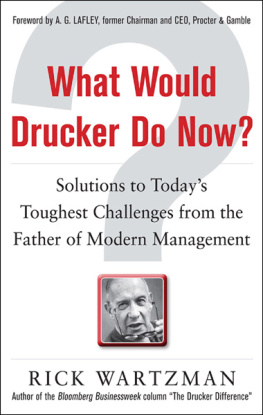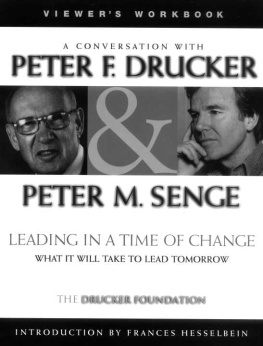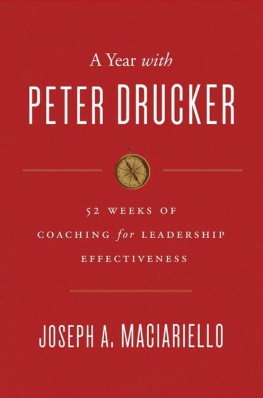Peter F. Drucker - Peter F. Drucker on Practical Leadership
Here you can read online Peter F. Drucker - Peter F. Drucker on Practical Leadership full text of the book (entire story) in english for free. Download pdf and epub, get meaning, cover and reviews about this ebook. year: 2020, publisher: Harvard Business Review Press, genre: Romance novel. Description of the work, (preface) as well as reviews are available. Best literature library LitArk.com created for fans of good reading and offers a wide selection of genres:
Romance novel
Science fiction
Adventure
Detective
Science
History
Home and family
Prose
Art
Politics
Computer
Non-fiction
Religion
Business
Children
Humor
Choose a favorite category and find really read worthwhile books. Enjoy immersion in the world of imagination, feel the emotions of the characters or learn something new for yourself, make an fascinating discovery.
- Book:Peter F. Drucker on Practical Leadership
- Author:
- Publisher:Harvard Business Review Press
- Genre:
- Year:2020
- Rating:4 / 5
- Favourites:Add to favourites
- Your mark:
- 80
- 1
- 2
- 3
- 4
- 5
Peter F. Drucker on Practical Leadership: summary, description and annotation
We offer to read an annotation, description, summary or preface (depends on what the author of the book "Peter F. Drucker on Practical Leadership" wrote himself). If you haven't found the necessary information about the book — write in the comments, we will try to find it.
Peter F. Drucker on Practical Leadership — read online for free the complete book (whole text) full work
Below is the text of the book, divided by pages. System saving the place of the last page read, allows you to conveniently read the book "Peter F. Drucker on Practical Leadership" online for free, without having to search again every time where you left off. Put a bookmark, and you can go to the page where you finished reading at any time.
Font size:
Interval:
Bookmark:

The Drucker Library
Peter F. Drucker on Technology
Peter F. Drucker on Business and Society
Peter F. Drucker on Management Essentials
Peter F. Drucker on Nonprofits and the Public Sector
Peter F. Drucker on Economic Threats
Peter F. Drucker on Globalization
Peter F. Drucker on Practical Leadership
Peter F. Drucker on the Network Economy

HBR Press Quantity Sales Discounts
Harvard Business Review Press titles are available at significant quantity discounts when purchased in bulk for client gifts, sales promotions, and premiums. Special editions, including books with corporate logos, customized covers, and letters from the company or CEO printed in the front matter, as well as excerpts of existing books, can also be created in large quantities for special needs.
For details and discount information for both print and ebook formats, contact .
Copyright 2020 Harvard Business School Publishing Corporation
All rights reserved
No part of this publication may be reproduced, stored in or introduced into a retrieval system, or transmitted, in any form, or by any means (electronic, mechanical, photocopying, recording, or otherwise), without the prior permission of the publisher. Requests for permission should be directed to , or mailed to Permissions, Harvard Business School Publishing, 60 Harvard Way, Boston, Massachusetts 02163.
First eBook Edition: Aug 2020
ISBN: 978-1-63369-931-1
eISBN: 978-1-63369-932-8
This book is one of several volumes in the Drucker Library published by Harvard Business Review Press.
The essays in this volume were written between 1986 and 1991. When Peter Drucker collected them for this volume in 1991, he resisted, as he explained in an earlier volume of essays, the temptation to rewrite, contending that it was only fair to let the reader decide how well the authors opinions, prejudices, and predictions have stood the test of time.
Some fifty years later, modern readers may find Druckers language at times dated or inappropriate and some of his arguments controversial or utterly wrongheaded. But as editors we too have chosen to resist the urge to tamper with the original texts, for we did not feel confident we could always tell the difference between updating and censorship. Further, we believe that one of the many delights of these essays for current readers, who enjoy the advantage of complete hindsight extending over the entire period in which Drucker made predictions, is in judging how remarkably prescient and applicable so much of this thinking remains today.
About a year after my 1985 book, The Frontiers of Management, had come out, I received the following letter: I am the CEO of a still fairly small but fast-growing specialty-chemicals company. I try to read five or six of your chapters every weekend, and ask my senior associates to do likewise. When I finish one of the chapters I then ask myself in writing: What does this chapter mean for me as a senior business executive? What does it mean for my colleagues on the management team? What does it mean for the company? What action does it implyfor me, the management team, the company? What opportunities does it identify for us? What changes in goals, strategies, policies, structure, might it point to? We then discuss our respective answers at one of our management meetings. And six months later we discuss the same answers again to see what actions we have actually taken and how they have worked out, but also what actions we should have taken and might still undertake. Of course, a good many of your chapters do not directly apply to us; they lead to understanding rather than to action. But a good many, again and again, stimulate us to do something or to stop doing something. And the most valuable ones are the chapters that make me say: Of course, I have known this all along. Why havent I acted on it?
The chapters in this book cover a wide range of topics, and they were written over a five-year period. The individual chapters were not planned to fill a spot on an outline sketched out five years ago. But each was most definitely designed from the beginning to address one of the dimensions of the executives world: the economy and economics; people; management; organizationboth outside and inside the executives particular enterprise.
In addition, each chapter was planned from the beginning to achieve two purposes. One: to explain to executives immersed in the demands of their own tasks and their own enterprise to understand the rapidly changing world in which they work and produce results. The other was to stimulate them to action and to provide tools for effective action.
The executives world has been turbulent for as long as I can rememberI started work two years before the 1929 crash! It surely has always been turbulent, but never as much as in these past few yearsor in the years immediately ahead. Only a few short years ago, for instance, we worried about inflation and about the ascendancy of all kinds of new financial superpowers: global banks, transnational brokerage houses, junk-bond kings, takeover tycoons, and the like. Inflation is, of course, still a dangerand will remain one as long as governments pile up huge deficits. But executives in the 90s are more likely to be worried by financial stringencies and credit crunchesthat is, by the typical deflation symptoms. The monetary giants of yesterday are everywhere in full retreat and mired in scandal. The international economy of 1992 also bears almost no resemblance to that of 1980 or 1981 (when Japan still ran a trade deficit, the European Economic Community was still pie in the sky, and lending billions to Brazilian generals still seemed to be the truly conservative thing to do). So, every chapter in this book tries to create understanding of what changes are ahead and what they mean for the economy, people, markets, management, the organization. Every one of the chapters tries to create the understanding the executive needs to manage for tomorrow rather than for yesterday.
But every chapter was also designed from the beginning to stimulate actionto identify new opportunities; to point out areas where changesin process and product, policies, markets, and structuremight be needed; where and what to do and where and what to stop doing.
The five years during which the chapters of this book were being written were years of unprecedented political upheaval. The earliest chapter in this book was written in August 1986; in the same week I wrote the first draft of what was publishedin early winter of 1989as , was done almost exactly five years later, in August 1991 in the week after the Communist hardliners putsch against Mr. Gorbachev had failed. Its title, however, is The New Japanese Business Strategies. This book, in other words, focuses on executives, in their organizations and in their work. The show must go on is its mottoand managements show is effective action for results. To help executives act and to produce results, to help them perform in a turbulent, dangerous, fast-changing economy, society, and technologythat is the purpose and mission of this book.
Peter F. Drucker
Claremont, California
Thanksgiving, 1991
Q: You have written that there is a profound sense of unreality about both politics and economics today. What do you mean?
Font size:
Interval:
Bookmark:
Similar books «Peter F. Drucker on Practical Leadership»
Look at similar books to Peter F. Drucker on Practical Leadership. We have selected literature similar in name and meaning in the hope of providing readers with more options to find new, interesting, not yet read works.
Discussion, reviews of the book Peter F. Drucker on Practical Leadership and just readers' own opinions. Leave your comments, write what you think about the work, its meaning or the main characters. Specify what exactly you liked and what you didn't like, and why you think so.


